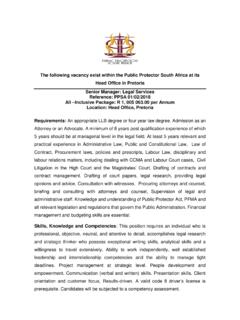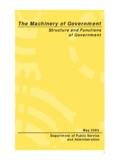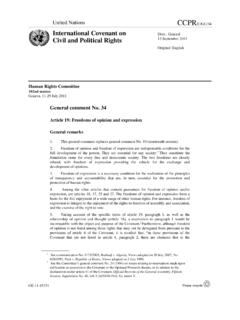Transcription of CONSTITUTIONAL & LEGISLATIVE MANDATE OF THE PUBLIC …
1 CONSTITUTIONAL & LEGISLATIVE MANDATE OF THE PUBLIC PROTECTOR Copyright 2010 Office of the PUBLIC Protector ISBN 978-0-620-46657-8 Physical Address: 175 Lunnon Street Hillcrest Office Park 0083 Tel: (012) 366 7000 Fax: (012) 362 3473 Toll Free: 0800 11 20 40 Fax2email: 086 575 3292 CONTENTS Foreword 4 1. The Constitution 5 2. The PUBLIC Protector Act 23 of 1994 7 3. The Executive Members Ethics Act 82 of 1998 31 4. Executive Ethics Code 33 5. Prevention & Combating of Corrupt Activities Act 12 of 2004 40 6. Promotion of Access to Information Act 2 of 2000 50 7. Electoral commission Act 51 of 1996 41 8.
2 Protected Disclosures 26 of 2000 43 9. National Archives and Record Service Act 43 of 1996. 44 10. National Energy Act 40 of 2004 45 11. Housing Protection Measures Act 95 of 1998 38 12. Promotion of Equality & Prevention of Unfair Discrimination 4 of 2000 38 13. PUBLIC Finance Management Act 1 of 1999 38 14. Lotteries 57 of 1997 51 15. Special Investigating Units & Special Tribunals Act 74 of 1996. 42 16. National Environmental Management Act 108 of 1998. 48 FOREWORD The PUBLIC Protector is a CONSTITUTIONAL institution. It is one of several institutions established by Chapter 9 of the Constitution to support and strengthen CONSTITUTIONAL democracy.
3 We ordinarily refer to these institutions as Chapter 9 Institutions. However, each of these institutions plays a distinct and unique role in supporting and strengthening CONSTITUTIONAL democracy The PUBLIC Protector is both an institution and a person. The person, who holds the same rank as a judge of the Supreme Court, is appointed on the basis of a parliamentary selection process, which culminates in a National Assembly vote followed by a Presidential appointment of whoever is recommended by Parliament. The PUBLIC Protector has a most general MANDATE of all the Chapter 9 Institutions. There are two key pieces of legislation that regulate the operations of the PUBLIC Protector. These are the PUBLIC Protector Act of 1994, and the Executive Members Ethics Act.
4 The powers under the PUBLIC Protector Act cover the conduct of all PUBLIC authorities except court decisions. The Executive Members Ethics Act empowers the PUBLIC Protector to investigate all allegations of violations of the Act and Code by the members of the executive, that is, Ministers, Premiers, and MECs etc. Other pieces of legislation, which include Anti Corruption legislation and the Protected Disclosures Act, also recognise the role of the PUBLIC Protector with regard to investigating state action and taking remedial action. The MANDATE of the PUBLIC Protector focuses on strengthening democracy by ensuring that all state organs are accountable, fair and responsive in the way they treat all persons and deliver services.
5 The MANDATE includes ensuring integrity and general good governance in the management of PUBLIC resources. The Constitution requires the PUBLIC Protector to investigate all complaints or allegations of improper conduct by PUBLIC officials and PUBLIC office bearers and take remedial action. Additional powers include conciliation, mediation and negotiating. Like all Chapter 9 institutions, the PUBLIC Protector is independent and subject only to the Constitution and the law. The PUBLIC Protector must be impartial and exercise its powers and perform its functions without fear, favour or prejudice. The PUBLIC Protector is accountable to the National Assembly and must report on activities and performance of functions to the Assembly at least once a year.
6 No person or organ of state may interfere with the functioning of the PUBLIC Protector. All organs of state are required by the Constitution to assist and protect the PUBLIC and other CONSTITUTIONAL institutions to ensure the independence, impartiality, dignity and effectiveness of these institutions. They are further forbidden from interfering with the functioning of the PUBLIC Protector and other CONSTITUTIONAL institutions. This booklet sets out CONSTITUTIONAL and LEGISLATIVE provisions that give a MANDATE to the PUBLIC Protector of the Republic of South Africa while regulating the PUBLIC Protector s discharge of its MANDATE . Adv T. N. Madonsela PUBLIC Protector of the Republic of South Africa 1.
7 THE CONSTITUTION Introductory Note The CONSTITUTIONAL establishes the PUBLIC Protector as one of the several independent institutions that are to strengthen and support CONSTITUTIONAL democracy. These institutions, which have different but complementary mandates are established by Chapter 9 of the Constitution. 181 Establishment and governing principles (1) The following state institutions strengthen CONSTITUTIONAL democracy in the Republic: (a) The PUBLIC Protector. (b) The South African Human Rights commission . [Para. (b) amended by s. 4 of the Constitution Second Amendment Act of 1998.] (c) The commission for the Promotion and Protection of the Rights of Cultural, religious and linguistic Communities.
8 (d) The commission for Gender Equality. (e) The Auditor-General. (f) The Electoral commission . (2) These institutions are independent, and subject only to the Constitution and the law, and they must be impartial and must exercise their powers and perform their functions without fear, favour or prejudice. (3) Other organs of state, through LEGISLATIVE and other measures, must assist and protect these institutions to ensure the independence, impartiality, dignity and effectiveness of these institutions. (4) No person or organ of state may interfere with the functioning of these institutions. (5) These institutions are accountable to the National Assembly, and must report on their activities and the performance of their functions to the Assembly at least once a year.
9 182 Functions of PUBLIC Protector (1) The PUBLIC Protector has the power, as regulated by national legislation- (a) to investigate any conduct in state affairs, or in the PUBLIC administration in any sphere of government, that is alleged or suspected to be improper or to result in any impropriety or prejudice; (b) to report on that conduct; and (c) to take appropriate remedial action. (2) The PUBLIC Protector has the additional powers and functions prescribed by national legislation. (3) The PUBLIC Protector may not investigate court decisions. (4) The PUBLIC Protector must be accessible to all persons and communities. (5) An report issued by the PUBLIC Protector must be open to the PUBLIC unless exceptional circumstances, to be determined in terms of national legislation, require that a report be kept confidential.
10 183 Tenure The PUBLIC Protector is appointed for a non-renewable period of seven years. 193 Appointments (1) The PUBLIC Protector and the members of any commission established by this Chapter must be women or men who- (a) are South African citizens; (b) are fit and proper persons to hold the particular office; and (c) comply with any other requirements prescribed by national legislation. (4) The President, on the recommendation of the National Assembly, must appoint the PUBLIC Protector, the Auditor-General and the members of- (a) the South African Human Rights commission ; [Para. (a) amended by s. 4 of the Constitution Second Amendment Act of 1998.] (b) the commission for Gender Equality; and (c) the Electoral commission .











